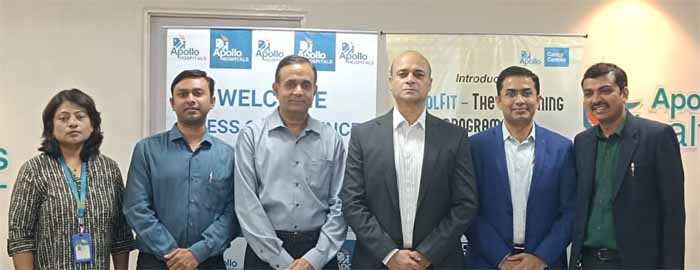- Early screening can prevent colorectal cancer, detect precancerous polyps, increase survival rates, and reduce treatment costs.
- ColFit aims to increase colorectal cancer screening in both older and younger populations, with a strong emphasis on early detection.
- Integrates the Faecal Immunochemical Test (FIT) with globally accepted benchmarks,
NE HEALTH BUREAU
AHMEDABAD, MAR 26
In response to the rise in colorectal cancer (CRC) cases across India, Apollo Cancer Centre (ACC) has on Wednesday launched ColFit, a comprehensive screening program designed to detect and prevent colorectal cancer at an early stage. This initiative aims to improve survival rates, reduce treatment costs, and address the concerning trend of late-stage diagnoses, which currently lead to poor outcomes and higher healthcare burdens. Despite being highly preventable and treatable with early detection, a significant proportion of CRC cases in India are identified at advanced stages, resulting in lower survival rates and increased treatment expenses.
ColFit focuses on expanding CRC screening among both older and younger populations, emphasizing the importance of early detection. While India’s age-standardized rate (ASR) for CRC remains relatively low at 7.2 per 100,000 males and 5.1 per 100,000 females, the absolute number of cases is substantial given the country’s population of over a billion. More alarming is India’s five-year survival rate for CRC, which stands at less than 40%—among the lowest globally. The CONCORD-2 study further highlights a troubling decline in five-year survival rates for rectal cancer in certain Indian registries. (Source Link)
Colorectal cancer often presents with symptoms that should not be overlooked. These include persistent changes in bowel habits (such as chronic diarrhoea or constipation), rectal bleeding or blood in the stool, unexplained weight loss, and ongoing abdominal discomfort or cramps. Key risk factors include a low-fibre diet, sedentary lifestyle, obesity, genetic predispositions, and a family history of CRC. Recognizing these symptoms and risk factors is critical for early detection and prevention.
Apollo Cancer Centres’ ColFit program introduces a groundbreaking approach to CRC detection by incorporating the Faecal Immunochemical Test (FIT), a non-invasive, highly accurate screening tool that identifies hidden blood in stool—a potential early indicator of CRC. FIT requires only a single sample, offers higher sensitivity, and eliminates the need for dietary restrictions, making it a convenient and patient-friendly option.
The ColFit screening process follows a structured pathway:
- Registration and Risk Stratification: Patients are categorized based on risk levels.
- Average-risk individuals(aged 45+ with no family history) undergo FIT and stool tests.
- High-risk patients(with a family history, genetic syndromes, or inflammatory bowel disease) are recommended FIT and colonoscopy.
- Analysis and Diagnosis: Abnormal results prompt further analysis of stool samples for occult blood or DNA mutations, while colonoscopy findings are reviewed for polyps or tumours.
- Follow-Up and Counselling: Negative cases are advised periodic follow-ups (1-10 years), while positive cases receive further evaluation, including biopsies if necessary. Post-screening, patients receive counselling on lifestyle modifications, personalized screening plans, and genetic counselling for high-risk individuals.
This comprehensive approach ensures early detection, timely intervention, and effective prevention, significantly reducing the risk of CRC progression.
Dr. Harsh Shah, Consultant GI and HPB Cancer Surgeon, Apollo Cancer Centre, stated, “We must shift from reactive care to proactive screening for colorectal cancer. Lifestyle factors such as poor diet, sedentary habits, and obesity are major contributors to rising CRC cases. A high-fiber diet, regular exercise, and proactive screenings can play a pivotal role in prevention. With ColFit, we are making early detection accessible through FIT, a simple, non-invasive test that can significantly reduce complications and improve outcomes.”
Dr. Apurva Shah, Consultant Gastroenterologist, Hepatologist and GI Endooscopist, Apollo Hospital Ahmedabad, added, “Colorectal cancer is increasingly affecting both young and elderly populations in India, yet survival rates remain alarmingly low due to late-stage diagnoses. While countries with established screening programs have seen improved outcomes, nearly 50% of CRC cases are detected at advanced stages, with an additional 20% presenting with metastases (Link). Early screening and awareness are critical to reversing this trend. At Apollo Cancer Centres, we are committed to advancing early detection through ColFit, precision treatments, and holistic care to improve patient outcomes and reduce the burden of CRC in India.”
Cdr Jelson Kavalakkat, Unit CEO, Apollo Hospitals Ahmedabad, highlighted the organization’s mission: “As a leader in advanced cancer care, our goal is not only to treat but also to educate and raise awareness about the preventable nature of colorectal cancer. With cutting-edge treatments and a multidisciplinary approach, we deliver precision care that enhances survival rates and quality of life. Our team works closely with patients to develop personalized treatment plans tailored to their unique needs. Through ColFit, we aim to empower individuals to take control of their health, ensuring early detection and better outcomes. By offering a seamless screening-to-treatment pathway, we are committed to reducing the CRC burden in India.”
Colorectal cancer is one of the most preventable and treatable cancers when detected early. Apollo Cancer Centres urges individuals, especially those with a family history of CRC or persistent symptoms, to prioritize regular screenings. Taking proactive steps such as routine FIT tests, timely colonoscopies, and adopting healthier lifestyles can help curb the rising trend of colorectal cancer and save countless lives.












